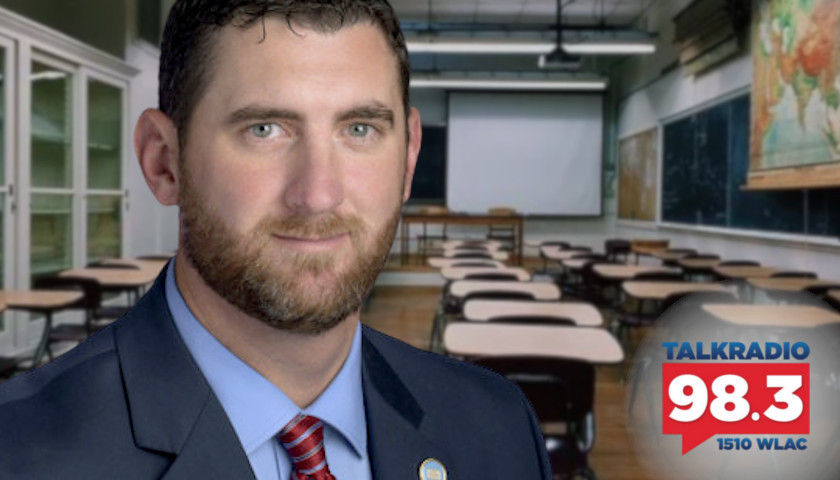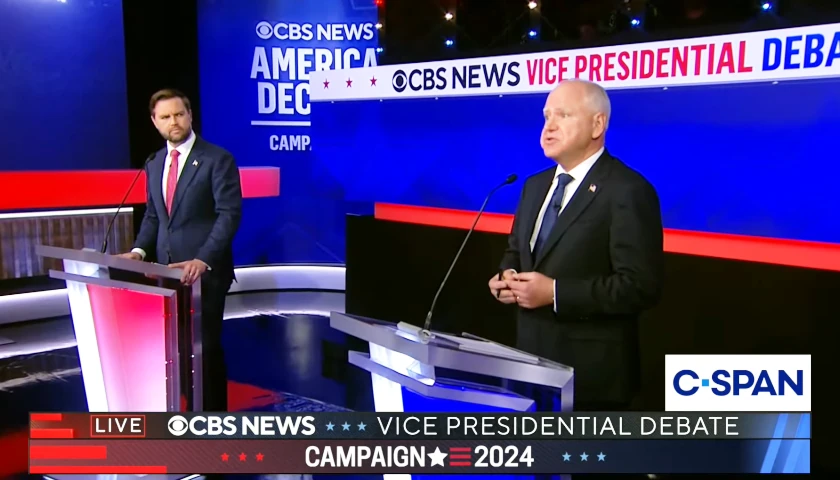Live from Music Row Tuesday morning on The Tennessee Star Report with Michael Patrick Leahy – broadcast on Nashville’s Talk Radio 98.3 and 1510 WLAC weekdays from 5:00 a.m. to 8:00 a.m. – host Leahy welcomed TN (R) State Representative of the 70th District Clay Doggett to the newsmakers line to discuss the upcoming education special session in the General Assembly that will prioritize literacy in public schools.
Leahy: We are joined now on our newsmaker line by state Representative Clay Doggett the man who beat Boss Doss. Barry Doss. The guy who brought you the gas tax and Clay Doggett opposed that and won a great victory for the grassroots. Representative Doggett, welcome to The Tennessee Star Report.
Doggett: Hey, good morning. Thank you for having me.
Leahy: Well, what does this special session on education look like to you?
Doggett: Well it’s something that I think that with COVID created a unique opportunity. Something that we probably would not have been able to attempt to address had COVID-19 had occurred. Which I know that’s an odd thing. But when I became when I first came into the legislature and several of my colleagues with and I have school-age children, we looked at in saw that literacy was something that was you know, it was taught differently in the school systems when I grew up. In the school system, we used phonics.
Now over the past several years, they’ve gotten away from that. We’ve got teachers that are in the classroom teaching that never had phonics growing up. And so the way that they’re teaching reading and writing and comprehension is different from the way that I learned it growing up. And so one of these bills helps address some of the literacy.
And from what I understand from my colleagues the main push is to get back into using phonics in the classroom again. And so that’s one that I’ve really got my own as just literacy bill that we are having. A couple more address some of the learning loss that we have with summer school and some tutoring programs that will be offered throughout the year because last year they sent the students home in March when COVID really kicked off.
And so a lot of kids, unfortunately, did not have that opportunity at home to learn from the parents or the guardians like others have. In my honest opinion, our kids have fallen behind just because they hadn’t been in the classroom and had those opportunities for success. And so there’s a piece of legislation the governor’s proposed and members of our education committee seem to be supportive of.
And it’s going to open up a summer school type tutoring program that will take place this summer to help catch up with those that need to be caught up. And so I’m really interested in looking at that one as well and seeing how that goes. And then the final administration bill that was the call for this is basically for testing.
We’re going to test. But in years past that was a big part of the evaluation of the instructor and the school and the school district. And what this one is going to do is we’re going to have the test but only use those scores or evaluation if they benefit the student. If they can benefit the instructor, the educator, or the school district.
Leahy: So you talked about phonics and then the current way that reading, writing, and arithmetic are taught. What is your understanding of the difference between the current methodology and the phonics approach that you’re discussing that’s apparently going to be included in one of these bills?
Doggett: Well, you know, I’m not an expert in education by no means. Just from looking at whenever my children began school, my oldest is a fourth-grader, and then my the next one that’s in school she’s in the first grade. And then I’ve got my youngest daughter who will start kindergarten in the fall.
But when I sat down with my oldest son and he was learning to read in school, of course, we had done some things with him at home before he started school, but I was telling them hey, sound it out. Sound the word out. And it was like I was talking to a wall. He had no idea what I was talking about. And so I spoke with his teacher and she said, oh we don’t teach phonics anymore. We use sight words where they just see the letters and try to recognize that those words go together.
I think that scientifically it may use some different parts of your brain to do that. I really don’t understand the makeup of that. But studies have shown in some of these other states that are ranking higher in literacy that they went back to using that phonics method for teaching reading and early school age K-3 levels. And so I think that moving back to this is going to be very beneficial to our children as we go forward.
Leahy: Very interesting. I’m going to just plant a seed with you. There’s a method of instructing reading, writing, and arithmetic that I would love to chat with you about. I’m not an expert on it as well but it’s been very very successful. Perhaps the most successful way of teaching reading, writing, and arithmetic. It is called direct instruction. It has been around since the 1960s or so.
You may not have heard of it but it’s actually the methodology that a new private school here in Middle Tennessee uses called Thales Academy. They’ve used it successfully for about 10 years in eight schools in North Carolina. So when you and I have a chance to have a cup of coffee in person, we’ll talk a little bit about direct instruction. I’m very curious to see if this is the methodology that members of the state of Tennessee General Assembly might consider introducing to K-12.
Doggett: Fantastic.
Leahy: Now after the special session is over, what will be the agenda of the Tennessee General Assembly?
Doggett: Well, from what I understand, my hope is that we pick up with some of the things that were left off last year. Last year we started the year with everything that went on and we took our break and a recess. And then the Senate came back and only wanted to take up legislation that was going to deal with COVID-related issues so a lot of the legislation that we had after one had several bills that addressed some things in the criminal justice realm with restitution and second amendment rights.
Making sure that we listed those rights in the code and protected those even further than what protections we have now. And all those were pushed to the side because they were not going to be taken up in the Senate. A number of my colleagues had very good legislation that did not get that opportunity to be heard. And so from the consensus I have with fellow members is that we’re going to try to bring this legislation again this year.
Leahy: And what prospects do you think it will have? And what’s the process that you as a state representative go through to turn something like that into legislation for passing in the statehouse and then getting a corresponding sponsor over in the Senate? And then getting it signed by the governor? What is that like?
Doggett: Well it’s really neat. Even when I was you know, 15, 20 years old I thought that when the legislation came forward that these lawmakers would sit around and they were scratching their heads and thinking of things to do. And they would come up with an idea and draft it out and it would go into law somehow. But really we have ideas. We have beliefs and things that we bring with us.
But it’s when constituents call and they have an issue and say hey I’ve got this going on or this has occurred or this could be done better. Maybe it’s in business or in law enforcement or in the medical community or education. And they bring these issues to you and you take them and you sit down and you work it through and you compare what’s in the current statute.
And say yeah, you know, this is a great idea let’s try it. And so once you get that legislation drafted, you have to find someone as a member of the House. I need that same legislation carried on that Senate side. And so I’ll go find a Senate member who will sponsor that legislation for me on their side. We’ll run it through the House and we’ll run it through the Senate.
It will go through the committee process. It’s a very vetted process. Sometimes it may go through as many as five or even six committees before it ever makes it to the House floor. And then it will be voted on. And once it’s passed in the House and in the Senate it will go before the governor. And if he has his approval he’ll sign-on to that and it will go into law.
Leahy: That is a long process…
Listen to the full interview here:
– – –
Tune in weekdays from 5:00 – 8:00 a.m. to the Tennessee Star Report with Michael Patrick Leahy on Talk Radio 98.3 FM WLAC 1510. Listen online at iHeart Radio.





